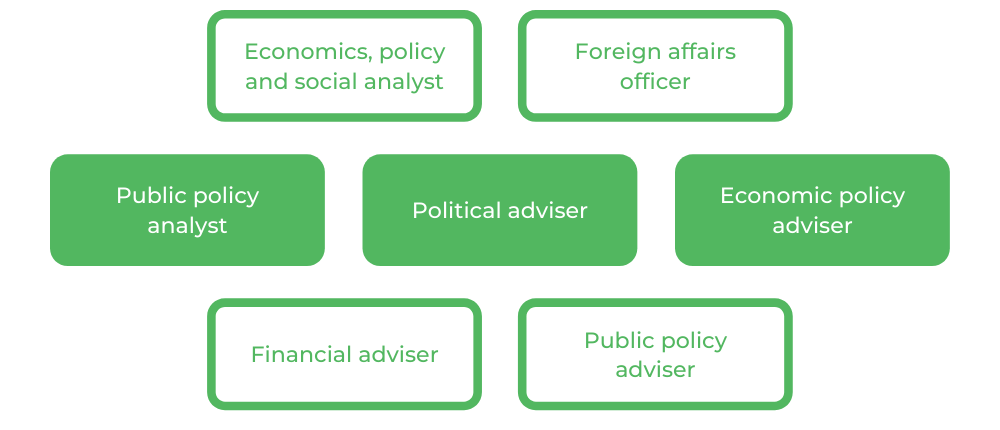
Now that you’ve read about all the essentials of a Bachelor of Politics, Philosophy and Economics (PPE) at ANU, has the degree piqued your interest?
In this article, we’ve asked Geneviev, a fifth-year PPE/Law student from ANU, to give her perspective on the course.
So, if you want to read a more personal insight into the degree, then keep scrolling!
Why should you study a PPE degree at ANU?
Top 3 Pros of a PPE Degree
Top 3 Cons of a PPE Degree
Mistakes You Shouldn’t Make
Things to Know Before Starting ANU PPE
What Makes this Degree Different
Motivations for Studying ANU PPE
Potential Career Paths
Why should you study a PPE degree at ANU?
A Bachelor of PPE at ANU is an excellent addition for anyone wanting to study a humanities-related double degree but wants something different from an Arts degree. Since it reaches into three branches of social sciences, the course provides an enriching perspective for its students as they are introduced to various schools of thought and approaches.
Through this degree, you’ll gain a keen eye into critically thinking about the larger world and especially the social institutions which structure our daily lives.
On its own, a Bachelor of PPE is great for students who wish to work in the public sector.

Top 3 Pros of a PPE degree
#1: A focus on theoretical study
Geneviev first tells us that a Bachelor of PPE is “very theoretical, which is a huge plus for someone like myself who’s happy to trawl through readings on economic history and political philosophy”.
This course will be enjoyable for those who not only enjoy a challenging read but forming persuasive and logic-led arguments. From learning philosophical reasonings to the discussion and evaluation of political issues, the units will often get you thinking deeply one way or the other.
#2: PPE Integrative courses
“There are three courses in the degree which seek to ‘integrate’ the three disciplines and examine the bridges between politics, philosophy and economics,” Geneviev says. “These courses have by far been my favourite and why I continue to go on about how much I love PPE to people.”
There is one PPE integration unit in each year of study. These are classes which are always interesting as they are mainly focussed on class discussion, solving puzzles in social issues and applying your knowledge to new areas.
#3: Good counterpart to law
“If you like law and like seeing a bit of cross-over between your degrees then PPE is really great,” Geneviev says.
The PPE/Law double-degree is quite popular at ANU. It’s similar to the Arts/Law or Economics/Law programs in that the degrees complement each other, however PPE is even more closely related to Law.
Geneviev explains, “There can often be a bit of theoretical cross-over between law and politics and law and philosophy.“
Top 3 Cons of a PPE degree
#1: Dry compulsory courses
“The compulsory courses are very dry and in a double-degree, you will spend roughly the first two years completing these compulsory courses,” Geneviev comments.
Geneviev gives some tips for what to do if you’re not enjoying the PPE units: “If after a year you don’t like it, know that you have the flexibility to change degrees and that the courses you have completed can be credited under other degrees,” Geneviev says, “because most first year courses are very general and are requisites for other more generalist degrees such as Arts and Economics.”
It also can be worthwhile to stick it out and complete the compulsory courses.
“If you kind of like it and don’t mind pushing through the degree, stick it out till you start the disciplinary electives — they are far more interesting than the compulsory first-year, 1000 level courses,” says Geneviev.
Students get to choose their electives roughly after the first year of a single degree or after the first two years of a double degree.
#2: No majors
Since the course already delves into three branches of the social sciences, there isn’t room for any majors or specialisations.
As Geneviev puts it, “You do roughly the same number of courses for each discipline, so you’re kind of minoring in each area. I didn’t mind this too much because I liked all the areas, but those who had a keen interest in one of the areas, would either push through completing the degree or swap to an Arts or Economics degree.”
#3: Hard to structure the degree (for double degree students)
Lastly, it is especially hard to structure a Bachelor of PPE alongside your second degree since you choose your units/electives after the second year. For Geneviev, it is valuable to have a rough plan.
“Have a degree plan from the very start of your degree and reevaluate the plan every semester,” she recommends. “The plan doesn’t have to be perfect, but having a plan is very important in a degree like PPE where there are not a lot of electives.”
However, she notes that each year, more and more electives are being offered.
Any regrets?
“I don’t think I have any regrets,” Geneviev says, “but one thing I often hear from people who do regret doing PPE and switch from PPE to an Arts degree is that there is very little flexibility in a double degree.
“Remember that you always have time in uni to transfer degrees and nothing is set in stone — if you’re not vibing with PPE try something else.”
What do you wish you had known before starting PPE at ANU?
Geneviev wishes she knew the importance of planning her electives.
“Looking back now, I wish I had been told that the degree is quite dry until you start the disciplinary electives, and that in a double degree there is not much scope for choosing electives and you should carefully plan your degree,” she says.
“That said, I don’t think that would’ve meant much to me at the time, nor would that have deterred me from taking the degree.”
She recommends new students to speak to later-year students: “We are (paying myself a compliment I know) well-seasoned and equipped to provide advice to younger students about degree structures and course preferences. Don’t be afraid to reach out — we don’t want you to do bad!”
What makes this degree different from the ones offered at other universities?
“I think compared to many of the other universities that offer this degree, ANU is a more reputable university and has been offering this degree for longer. ANU also has a strong Politics and Philosophy faculty and many of the politics and philosophy courses are run well and taught by renowned academics,” Geneviev comments.
What inspired you to choose PPE at ANU?
Geneviev explains that she chose a Bachelor of PPE as it aligned with her interests. She says, “At the time, I also thought it was quite a unique degree and that it would offer me a more competitive edge on students who were completing an Arts/Law and Econ/Law degree.”
As for studying at ANU, she explains, “I also really wanted to move away from Sydney/home and try living independently. ANU is also quite a reputable university and is well-known for Law as well so it seemed like the perfect option for me.
“I didn’t really know much or anything about Canberra, but I can very confidently say that it is an incredible place to live if you are thinking about living independently for the first time.”
ANU also has a close-knit culture: “Almost everyone is a university student so its house party galore. If you are thinking of living on campus, I would highly recommend it for the first few years. It’s an invaluable experience and one that you honestly will never be able to experience at any other life stage,” Geneviev says.
What are the possible career paths?

Politics, Philosophy and Economics graduates can transfer their critical knowledge on the structure of society into public, private and non-profit sectors, wherein notable career options include:
-
- Economics, policy and social analyst
- Foreign affairs officer
- Public policy analyst
- Political adviser
- Economic policy adviser
- Financial adviser
- Public policy adviser
Lynn Chen is a Content Writer at Art of Smart Education and is a Communication student at UTS with a major in Creative Writing. Lynn’s articles have been published in Vertigo, The Comma, and Shut Up and Go. In her spare time, she also writes poetry.


